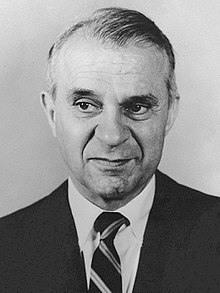
Back فاسيلي ليونتييف Arabic فاسيلى ليونتييف ARZ Vasili Leontyev Azerbaijani واسیلی لئونتیف AZB Wassily Leontief BAR Васіль Васільевіч Лявонцьеў Byelorussian Васіль Лявонцьеў BE-X-OLD Василий Леонтиев Bulgarian Wassily Leontief Catalan Wassily Leontief Czech
Wassily Leontief | |
|---|---|
Василий Леонтьев | |
 Leontief in 1973 | |
| Born | Wassily Wassilyevich Leontief August 5, 1905[2] |
| Died | February 5, 1999 (aged 93) New York City, U.S.[3] |
| Citizenship | Russian, Soviet, American |
| Alma mater | University of Leningrad (MA) University of Berlin (PhD) |
| Known for | Input–output analysis |
| Spouse | Estelle Marks (since 1932)[4] |
| Awards | Nobel Memorial Prize in Economic Sciences (1973) |
| Scientific career | |
| Fields | Economics |
| Institutions | University of Kiel New York University Harvard University |
| Thesis | Wirtschaft als Kreislauf (The economy as a circular flow) (1928) |
| Doctoral advisor | Ladislaus Bortkiewicz Werner Sombart |
| Doctoral students | Paul Samuelson Peter B. Dixon Thomas Schelling Robert Solow Kenneth E. Iverson Vernon L. Smith Richard E. Quandt Hyman Minsky Dale W. Jorgenson[1] Michael C. Lovell Karen R. Polenske Hollis B. Chenery |
Wassily Wassilyevich Leontief (Russian: Васи́лий Васи́льевич Лео́нтьев; August 5, 1905 – February 5, 1999), was a Soviet-American economist known for his research on input–output analysis and how changes in one economic sector may affect other sectors.[5]
Leontief won the Nobel Memorial Prize in Economic Sciences in 1973, and four of his doctoral students have also been awarded the prize (Paul Samuelson 1970, Robert Solow 1987, Vernon L. Smith 2002, Thomas Schelling 2005).
- ^ Jorgenson, Dale W. (1998) Growth, Vol. 1: Econometric General Equilibrium Modeling. Cambridge, Massachusetts: MIT Press. ISBN 026226322X
- ^ "The Sveriges Riksbank Prize in Economic Sciences in Memory of Alfred Nobel 1973". NobelPrize.org.
- ^ Wassily Leontief Birth Certificate. U.S. Library of Congress
- ^ Jain, C. "Spouse - Wassily Leontief Biographical". Wassily Leontief Biographical.
- ^ Dalyell, Tam (11 February 1999). "Obituary: Wassily Leontief". The Independent. Retrieved 18 May 2019.